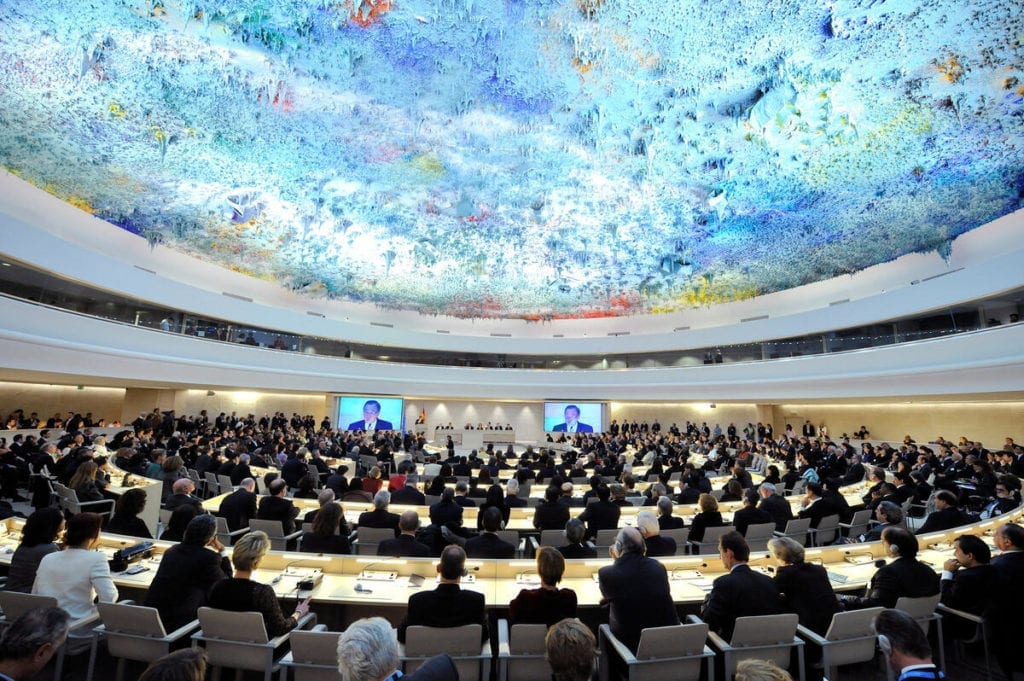Center Urges UN Members to Consider Reproductive Rights in Assessing U.S.’s Human Rights Record

U.S. Peer Review at the UN Human Rights Council Scheduled for November 9
In preparation for the upcoming Universal Periodic Review (UPR) of the United States’ human rights record before the United Nations Human Rights Council (UNHRC), the Center for Reproductive Rights and a coalition of rights organizations have urged Member States to consider concerns about reproductive rights in their human rights assessment. The U.S.’s UPR is scheduled for November 9.
Established by the UN General Assembly in 2006, the UPR is a process through which the human rights record of every UN Member State is peer-reviewed under the auspices of the UNHRC every four years—essentially, given a human rights report card by the international community.
Titled “Reproductive Health, Rights, and Justice in the United States,” the Center’s coalition stakeholder report urges UN Member States to recommend to the U.S. that it take steps to eliminate racial disparities and discrimination in access to health care, including maternal health care; ensure access to abortion care; and address human rights violations against pregnant people who are incarcerated and in immigration detention. It also urges recommendations to end U.S. efforts to undermine sexual and reproductive health and rights through U.S. foreign policy, including the Global Gag Rule.
“Despite the Trump Administration’s repeated disavowal of international human rights protections for access to reproductive health care, including access to abortion, there is clear consensus by international human rights mechanisms and UN human rights experts that reproductive rights are human rights,” said Risa Kaufman, the Center’s Director, U.S. Human Rights. “The UPR is a critical opportunity to remind the United States of this fact, deepen the international record of rights violations within the United States, and provide a strong roadmap for reform.”
While the Trump administration pulled the U.S. out of the UN Human Rights Council in 2018, claiming the Council’s criticism of nations’ human rights records is biased, the U.S. is still subject to the UPR process.
Reproductive Health and Rights Under Assault in the United States
According to the Center’s May 2020 report, “Reproductive health, rights, and justice in the United States are under alarming and relentless attack…Since the United States’ last UPR, the political and policy landscape in the U.S. for reproductive rights and justice has worsened dramatically, resulting in a significant retrogression of rights, with a particularly harmful impact on marginalized communities and people experiencing multiple and intersecting forms of discrimination.”
Said Kaufman, “Our coalition stakeholder report details the ways in which the Trump administration is engaged in a comprehensive effort to undermine the UN system and curtail access to reproductive health care globally, while systematically undermining affordable access to the full range of reproductive health care within the United States—from quality prenatal and pregnancy care to abortion care. In doing so, the administration disregards the extraordinary harm to people of color, people with disabilities, LGBTQI people, immigrants, people who are low-income or living in poverty, and people who are incarcerated.”
At the interactive review conducted by the Human Rights Council on November 9, all UN Member States can ask questions and make recommendations to the U.S. An outcome report summarizing the review and including questions, comments and recommendations made by the States to the U.S. will then be issued and made available to the public.
The Center’s coalition stakeholder report urges Member States to recommend the U.S. take steps to improve reproductive rights and health, including:
- Eliminating racial disparities in access to health care and maternal mortality and morbidity, and addressing a rising maternal mortality rate.
- Enacting federal legislation affirming the constitutional right to abortion, to make decisions about one’s reproductive life, and to bodily autonomy without interference by the state.
- Ensuring, in the absence of such legislation, that wherever they live in the U.S., people are able to exercise their existing constitutional right to abortion care under Roe v. Wade. This should include working to remove the legal and practical obstacles low-income women face when attempting to exercise this constitutional, privacy-derived right, and repealing the Hyde Amendment, which denies insurance coverage of abortion care to people enrolled in Medicaid, military personnel, Indigenous people, and others.
- Reconciling conscience-based refusals to provide reproductive health care with international human rights standards.
- Guaranteeing discrimination-free access to health care, including for immigrants.
- Addressing the many risks to the human rights of pregnant migrant women associated with their detention in ICE custody, and ensuring that pregnant people in detention facilities receive all necessary and appropriate health care.
U.S.’s Retrogressive Laws and Policies Have Broad Impact
The Center took a leading role in preparations for this year’s UPR in response to a series of retrogressive trends in the U.S. These include laws and policies that impact people in the U.S. and around the globe. Among them:
- Hundreds of U.S. state laws that restrict abortion care in ways that disproportionately affect people of color and those with low incomes.
- A lack of social supports and basic health care services for people who cannot afford to pay for them.
- Mistreatment of pregnant people in immigration and detention.
- Use of the Helms Amendment to the Foreign Assistance Act to justify a complete ban on using federal foreign aid for abortion care.
- An expanded Global Gag Rule that withholds U.S. global assistance funds from non-governmental organizations (NGOs) outside the United States who use any funds, including their own non-U.S. funds, to provide information, referrals, or services for legal abortion or to advocate for access to abortion care.
The report of the recommendations from the review will be formally adopted at the UNHRC’s next session in March 2021. The U.S.’s formal response, if any, will take place at that time.
Read the Center’s full report, “Reproductive Health, Rights, and Justice in the United States”

